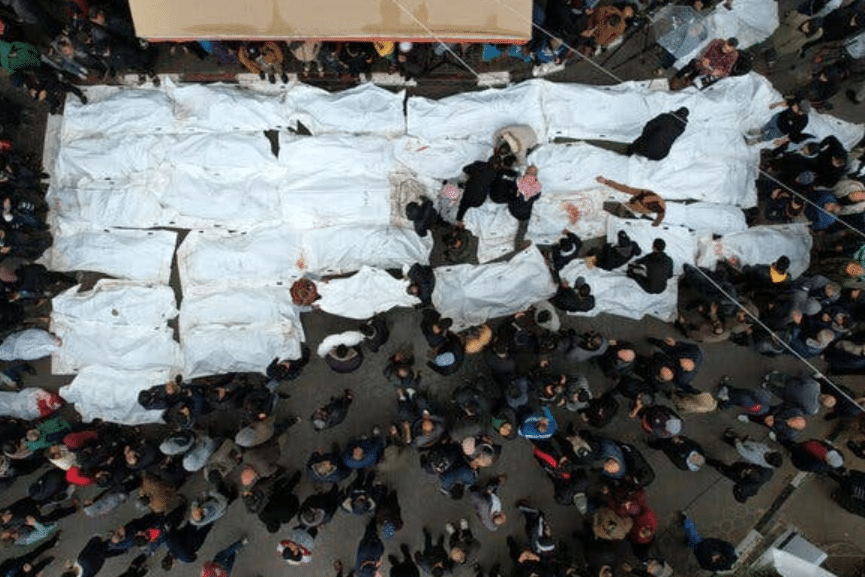The Israeli military said on Thursday that it had caused “unintended harm” to “uninvolved civilians” in two strikes this week on a densely packed Gaza Strip neighborhood, where, the local health authorities said, dozens were killed.
It was a rare admission of fault by the military over its conduct of the war. The military said it was targeting Hamas on Sunday when it launched two strikes on the central Gazan community of Al Maghazi, which has been flooded with Palestinians uprooted by war and crammed into homes by the dozen.
“A preliminary investigation revealed that additional buildings located near the targets were also hit during the strikes, which likely caused unintended harm to additional uninvolved civilians,” the Israel Defense Forces said in a statement.
“The I.D.F. regrets the harm to uninvolved individuals, and is working to draw lessons from the incident,” the statement said.
Israel has come under growing international pressure to scale back its heavy air and ground campaign in Gaza, where more than 20,000 people have been reported killed, after a Hamas-led attack on Israel on Oct. 7.
[The New York Times Report continues]
An Israeli broadcaster, Channel 12, reported on Wednesday night that, in a draft decision, a one-vote majority of justices favored striking down an amendment to a basic law that would prevent judges from overturning government decisions and appointments on the grounds that they are unreasonable, part of a wider judicial overhaul that divided the country.
The New York Times has not obtained a copy of the document, and Channel 12 did not publish it in full.
On Thursday, a spokeswoman for Israel’s courts said that “the writing of the ruling is not yet complete.” The court was expected to rule by mid-January, the legal deadline for two retiring justices to file their decisions.
In the months before the war, Mr. Netanyahu’s drive to reduce the authority of the judiciary brought the country to the brink of political paralysis. Now, the prospect that the court might overturn a law directly limiting its own authority has resurrected the specter of a constitutional crisis in a country engaged in its biggest war in decades.
[The New York Times Report continues]
Israelis opposed to the changes — including many reserve soldiers in the armed forces — at times brought Israel to a near standstill before the Hamas attack.
The critics also included two prominent Israelis who are now in the war cabinet: Benny Gantz, a longtime rival of Mr. Netanyahu’s; and Defense Minister Yoav Gallant, who warned that the political crisis was emboldening Israel’s enemies. Mr. Netanyahu had tried to fire Mr. Gallant after he called for a pause in enacting the overhaul, only to reverse the decision amid mass protests.
Mr. Gantz’s partnership with Mr. Netanyahu and his allies has been tenuous from the start, marked by divisions and mistrust, political analysts say, and it might not survive an added crisis.
The renewed political turmoil in Israel came as it pursued its goal of destroying Hamas in Gaza. But as in Al Maghazi, civilians were paying a heavy toll.
On Wednesday and Thursday, the Palestinian Red Crescent Society said, Israeli airstrikes killed more than 40 people near a hospital that the society operates in southern Gaza, one of the last functioning medical facilities in the enclave. Most of those killed around Al-Amal Hospital in Khan Younis were displaced people seeking shelter, said Nebal Farsakh, a spokeswoman for the organization.
[The New York Times Report continues]
Israelis also learned on Thursday that a woman believed to be a hostage in Gaza had, in fact, been killed in the initial Hamas attack. The woman, Judih Weinstein Haggai, 70, died on Oct. 7, her family and Kibbutz Nir Oz said in statements on Thursday. Ms. Haggai’s husband, Gadi Haggai, had also been listed as a hostage, but last week it was announced that he, too, was killed that day.
Patrick Kingsley, Anushka Patil and Raja Abdulrahim contributed reporting.
Isabel Kershner, a correspondent in Jerusalem, has been reporting on Israeli and Palestinian politics since 1990. Her latest book is “The Land of Hope and Fear: Israel’s Battle for its Inner Soul.” More about Isabel Kershner
View this New York Times Report

